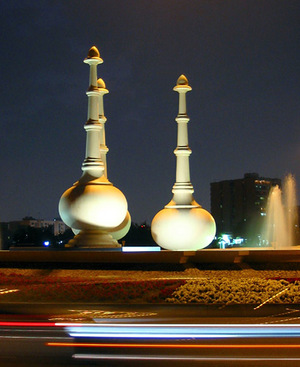 On Behalf of
Business & Finance Club - Finance & Investment - Dubai: Most Gulf Arab economies will grow in low single digits this year, little changed from previous forecasts, as debt restructuring will weigh on credit growth, a Reuters poll showed on Wednesday.
Qatar, the world's top gas exporter, is the exception, with its GDP set to surge 16.1 percent on the back of expanding gas facilities and infrastructure spending, according to the median forecast of economists polled between April 20-27. That would be unchanged from the previous Reuters poll in January but below an IMF forecast for 18.5 percent growth.
The global downturn cut output and froze credit in the world's top oil exporting region last year, but ongoing economic recovery of its main trading partners and generous government spending should support the six Gulf countries.
"The global economy is now returning to its growth path," said Farah Ahmed Hersi, senior economist at Masraf Al-Rayan in Doha. "The Gulf region sells strategic commodities that fuel the engine of the global economy."
The latest poll was based on responses from 17 analysts.
Saudi Arabia, the largest Arab economy and the world's top oil exporter, is expected to grow by 3.9 percent this year, well up from sluggish 0.2 percent growth in 2009, with no signs it will reduce fiscal stimulus, which is earmarked to total some $400 billion over five years until 2013.
"Our forecasts assume resumption of more or less normal bank lending in the Kingdom of Saudi Arabia by the middle of the year," said Jarmo Kotilaine, chief economist at NCB Capital in Bahrain.
OPEC-member Kuwait should grow by 3.3 percent in 2010, after a sharp downturn last year, but that is less optimistic than the central bank's forecast of 4-5 percent growth. Non-OPEC Oman and Bahrain should see GDP up 3.7 and 3.0 percent, respectively.
UAE economy lags
Growth prospects of the United Arab Emirates - the second largest economy in the Arab world - remained stable after worsening at the turn of the year due to the impact of debt restructuring in Dubai's flagship firms.
The UAE is seen growing 2.5 percent this year, the slowest pace in the Gulf, in line with government forecasts but above last week's 1.3 percent projection by the IMF.
"We need to differentiate very clearly between Dubai and its problems, being non-oil, no fiscal savings, exposure to leverage and a real-estate bubble, and the rest of the region which is not at all, or much less, exposed to these four problems," said Reinhard Cluse, EMEA economist at UBS in London.
"With a 30 percent weight in GDP, Dubai will pull down the UAE and there is going to be some spillover to Abu Dhabi."
The UAE economy, the world's third-largest oil exporter, would still improve from an estimated GDP contraction of 1.4 percent in 2009 thanks to Abu Dhabi's oil sector.
UAE banks are heavily exposed to state-owned Dubai World, which is still in talks with creditors over a $9.5 billion restructuring offer.
Eleven out of 16 analysts who answered the question said it was likely that more Dubai government-related entities would require assistance this year, while three said it was very likely.
Inflation seen muted
Inflation was seen staying in low, in single digits across the Gulf this year, well off 2008 record peaks, as the UAE and Qatar have slowly started to emerged from deflation last year, which was mainly caused by falling housing costs.
"Inflation is expected to remain in low single digits across the GCC (Gulf Cooperation Council) as demand-pull and cost-push price pressures are relatively muted," said Giyas Gokkent, head of research at National Bank of Abu Dhabi.
Saudi Arabia and Kuwait should see the highest average inflation of 4.4 and 4.3 percent in 2010, respectively.
In contrast, the UAE and Qatar are likely to have the lowest consumer price growth at 2.0 percent and 2.5 percent, well below over 10 percent seen in most Gulf countries in 2008.
Oil prices, which have more than doubled over the past year, should boost Gulf fiscal balances in 2010, allowing governments to sustain large stimulus packages unlike in other parts of the world.
|